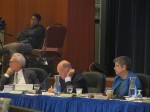SAN FRANCISCO – The University of California Board of Regents voted Thursday to approve a budget for current operations that assumes an increase in state funding, drawing concern from Gov. Jerry Brown and some regents about the sustainability of the University’s long-term budget model.
The UC’s core 2014-2015 budget, in its current form approved by the regents, includes a $383.1 million increase in expenditures, covered by various sources of revenue.
There is no tuition increase included in the budget or on the table in the near future. UC President Janet Napolitano announced Wednesday that she aims for a tuition freeze for 2014-2015 as well, which would be the third year the UC maintains stable tuition levels.
Under the state budget passed in July this year, the UC will receive $142 million in increased state funding – a 5 percent base increase that was tied to a tuition freeze for this year and the passage of Proposition 30 last November.
But UC officials plan to request an additional $120.9 million from the state, which Nathan Brostrom, executive vice president of UC budget operations, said was “a reasonable request” at a press conference on Wednesday.
The additional state funding would be used to pay pension costs, accommodate enrollment growth and bolster the academic quality of the University, according to the 2014-2015 budget for current operations.
The budget marks a shift toward longer-term investment after years of trying to simply absorb substantial budget cuts.
Of the requested increase, $64.1 million would pay for the state’s share of employer contributions to the University’s retirement program, $21.8 million would permit 1 percent in enrollment growth and $35 million would be used for academic improvement efforts, such as expanding resources like libraries and instructional technology, and reducing faculty and staff salary gaps.
The increase in expenditures reflects unavoidable increases like paying for the UC Retirement Plan, said Patrick Lenz, vice president of UC budget and capital resources, at the regents meeting on Thursday.
“The budget UC proposes reflects the need to fund both ongoing mandatory costs and long-neglected priorities,” said Napolitano in the 2014-2015 budget document.
Some regents, however, expressed serious concerns about relying on increases in state funding.
Gov. Brown, who is an ex-officio regent, said Thursday he does not think Sacramento lawmakers will allow an additional increase on top of the 5 percent base increase already being received.
“Going down the road, there’s a gap here. … This budget digs a big hole,” Brown said. “The needs you have may not be received (by the Legislature) in the way you just articulated. … That’s the reality sandwich we have to chew on.”
Brown said he thinks one of the only ways to bring in revenue in future years will be tuition increases, unless regents think of a very different way to approach the budget.
“If we want to keep tuition down, we’re going to have to reshape the way things are done,” he said. “That’s just the big bad state talking.”
Lieutenant Governor and ex-officio Regent Gavin Newsom expressed concern with passing the budget as it currently stands.
“I for one am uncomfortable passing a budget that has so many asterisks attached to it,” Newsom said. “We’re being asked to pass a budget that the governor is saying is unrealistic.”
Regent Russell Gould said he thinks the UC needs to present a longer-term financial plan for the regents to consider when making budgetary decisions.
“We need to have something that addresses the trajectory of where we’re headed,” Gould said. “Something that guides us beyond this snapshot.”
Napolitano reminded the board that her announcement on Wednesday, which included a tuition freeze, is intended for officials to devise a new long-term budget strategy.
On Thursday, the board also approved a budget for capital improvements both in 2013-2014 and 2014-2015, which includes just one project at UCLA – seismic corrections and fire lab safety at the Center for Health Sciences, priced at $48.3 million.
Directly after approving the budget, the regents approved the annual UC financial report, which marked the second-year decline of the University’s financial position.
Though UC’s operating revenues grew by $892 million in the past year – 4.4 percent – the UC’s net worth has gone down considerably because of issues surrounding pension costs, Brostrom said at the meeting.
